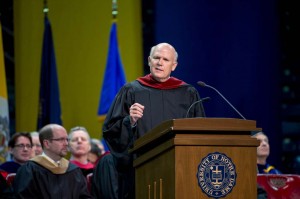Perhaps it’s just a rising tide lifting all boats, but General Motors stock has hit its highest close in more than two years – beating the $33 a share price tag set during its initial public offering in November 2010.
The resurgence comes as the overall stock market charges from one record to another, but also suggests that investors are impressed by the performance of the giant maker which earlier this month announced $865 million in earnings for the first quarter of 2013.
Though it has now delivered 3 consecutive quarterly profits, GM is still in the “early innings” of its recovery,” CEO Dan Akerson said over the weekend in South Bend, Indiana, where he delivered the commencement speech for Notre Dame business school graduates. GM is “on the cusp,” said the executive, of regaining its investment grade debt rating back. Akerson also suggested in his speech that the maker will rejoin the S&P 500 “before too long.”
GM was removed from that stock index when it plunged into bankruptcy in 2009.
A poll of 15 analysts conducted by the NASDAQ found 10 placing a “Strong Buy” recommendation on GM shares, two issuing “Buy” recommendations and the others rating the stock a “Hold.” None were on the “Sell” side.
GM stock has already posted a nearly 80% surge since it bottomed out last July at just $18.85 a share. The maker had launched its initial public offering in November 2010 at $33 a share.
“It’s been a wild ride for GM investors,” Christian Mayes, an automotive analyst with Edward Jones, told the Detroit News Friday.
“What a comparison. It’s day-and-night,” echoed Joe Phillippi, a long-time Wall Street auto analyst who now runs his own consulting firm, AutoTrends. But Phillippi is among the more cautious when it comes to predicting how high GM stock might rise. “I’m not convinced yet, not totally.”
The maker has a number of challenges it faces, Phillippi points out, especially in Europe where it has lost money 13 years in a row and only recently put in place the latest in a series of turnaround plans. European losses resulted in a slight decline in first-quarter earnings which compared to a $1 billion net a year earlier.
“They also have a long way to go to flesh out the product line,” he added, noting that most of GM’s profits are still coming from the light truck side of the business.
While the Chevrolet Malibu has performed far more poorly than GM expected following its launch last year, other new passenger cars have been faring better, including the new Cadillac ATS. And the maker has, on the whole, seen a strong improvement in its performance in a variety of quality and customers satisfaction surveys. It scored wins in six individual segments in the Total Quality Index released by Strategic Visions last week. That was twice as many as Japanese giant Toyota.
Since the beginning of this year alone, GM stock has increased 14% in value, something that comes as good news for consumers. The U.S. Treasury has been rapidly selling off the stock it got in exchange for its 2009 bailout of the automaker. And every penny increase can add up rapidly.
After selling off significant tranches of GM stock earlier this year, the government still holds a 16% stake in the maker, with plans to exit entirely by April 2014. The current run-up in value could hasten that.
But there’s little doubt that taxpayers will ultimately be left with billions in losses on the bailout. To break even, the remaining 241.7 million shares would have to go for $78 apiece. Even the most optimistic analysts don’t expect GM to come close to that level anytime soon.


Unfortunately the recent stock market rise doesn’t match the economic environment. Wall Street in particular is a rumor mill that feeds on itself and that can drive other market stocks.
Wall Street is setting up the naive for another bubble that will reward insiders and fleece the gullible. When the bubble bursts the U.S. economy will be hurt even more just like with the previous bubbles.
Now that GM’s stock price is up, how about they repay U.S. tax payers who lost millions on the loan to GM? It’s incomprehensible that GM should not be required to repay the losses that tax payers have suffered.